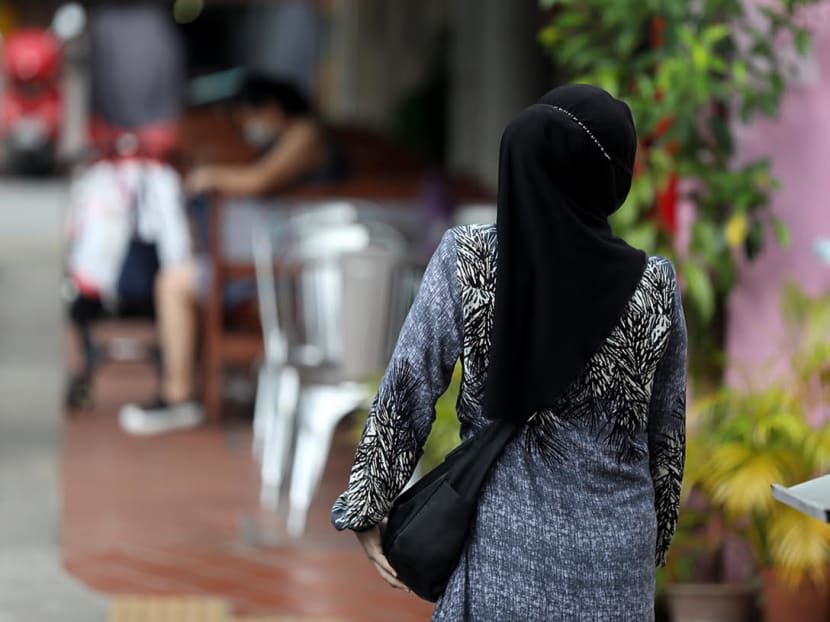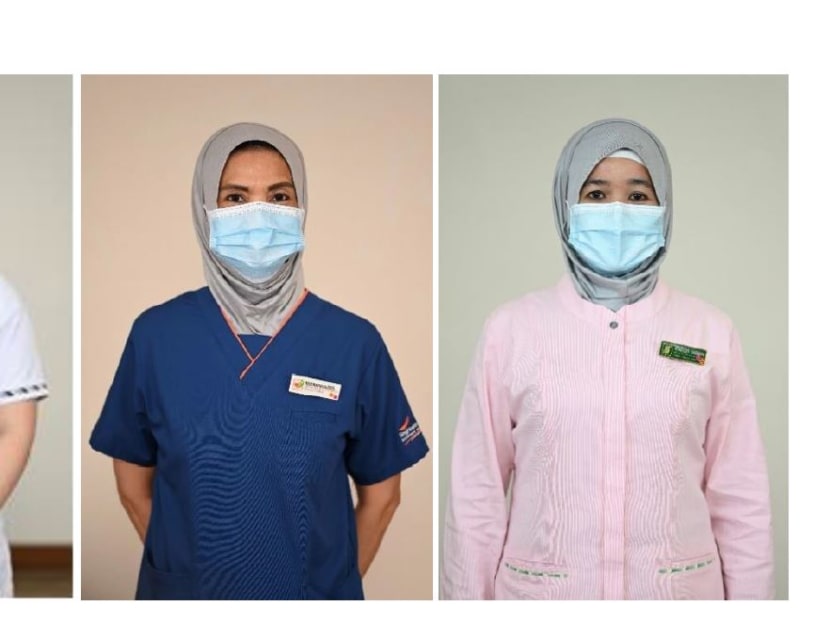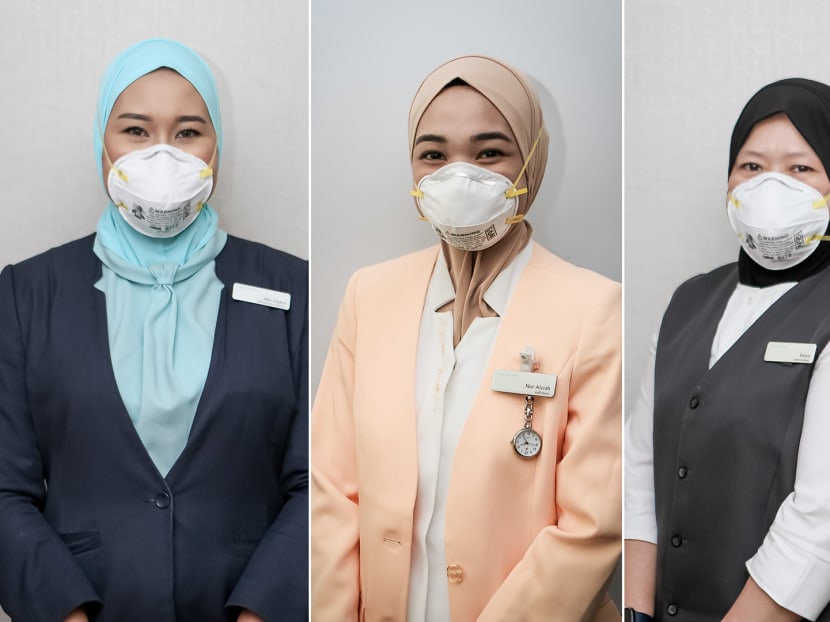New fatwa on wearing of tudung for healthcare staff says they must still prioritise personal, workplace safety
SINGAPORE — Singapore’s Islamic Religious Council (Muis) on Tuesday (Oct 26) issued a new fatwa — or religious guidance — on the wearing of tudung, or headscarf, for women who work in the public healthcare sector and other uniformed officers within the public service.

Muslim staff members working in the public healthcare sector, including nurses, will be allowed to wear a tudung, or headscarf, at work if they choose to do so, from Nov 1, 2021.
SINGAPORE — Singapore’s Islamic Religious Council (Muis) on Tuesday (Oct 26) issued a new fatwa — or religious guidance — on the wearing of tudung, or headscarf, for women who work in the public healthcare sector and other uniformed officers within the public service.
Muis said in a statement that although there is a religious duty for Muslim women to wear a tudung, the fatwa recognises that there could be other “legitimate factors and considerations that are of more critical importance”.
“This should be considered when choosing to make adjustments to the way religious obligations are observed in the workplace,” it added.
As such, a Fatwa Committee — a body under Muis that issues religious edicts to help Muslims here navigate modern society according to Islamic principles — advised that healthcare professionals, especially those in high-risk settings, must prioritise personal and workplace safety.
For example, this would include reducing the risk of infection by observing the “bare below elbow” policy, which requires some healthcare workers not to wear long sleeves, and the replacement of tudung in certain clinical contexts.
For other uniformed services such as the police force, where uniform policies have not changed, the Fatwa Committee said that there are legitimate considerations for Muslim women to continue with their work in those services, even if they cannot put on the tudung when working.
These considerations are the need to secure a stable and meaningful livelihood for oneself or one’s dependants, or both, and contributing to the well-being, stability and prosperity of the country.
“It is also important to ensure that Muslim women who can wear the tudung, if the uniform policies permit, should do so on their own volition and without any form of coercion,” Muis said.
From Nov 1, Muslim staff members working in the public healthcare sector, including nurses, will be allowed to wear a tudung at work if they choose to do so, Prime Minister Lee Hsien Loong said on Aug 29 during the National Day Rally.
CUSTOMISED HEADSCARVES
When asked how SingHealth intends to implement the tudung policy from Nov 1, Adjunct Associate Professor Tracy Carol Ayre, group chief nurse of the public healthcare group, said that its staff members are permitted to wear the tudung so long as the headscarf meets its guidelines on design, material and colour.
The group has produced tudungs meant for healthcare workers, featuring slits for surgical masks and stethoscopes, and they are made of light and moisture-wicking materials. These may be bought from stores within SingHealth institutions.
Staff members have a choice of three colours — white, light grey and dark grey, Adj Assoc Prof Ayre said. She chairs the group’s implementation working committee that guides policies to support SingHealth’s Muslim workers.
However, employees in high-risk clinical settings such as operating theatres, where a higher level of cleanliness and sterility is mandated, will not be allowed to wear a tudung.
“Staff are to continue with the use of the single-use disposable caps, where relevant, according to the prevailing infection prevention and control guidelines,” Adj Assoc Prof Ayre said, adding that disposable tudungs are still being considered.

In response to TODAY’s queries, National Healthcare Group, group chief human resource officer Olivia Tay said on Wednesday that staff may wear a plain black, navy blue or white tudung, based on feedback from staff on their preference.
She said that the material for the tudung, such as light and dri-fit material for non-air conditioned settings, should be suitable for staff to fully carry out their work.
She added that the material of tudung should not compromise the safe wearing of surgical or N95 masks.
When an N95 mask is to be worn with the tudung, all staff wearing it must be re-fitted without any extenders or modifications to N95 masks with the tudung on, to ensure that a proper seal is achieved, she said.
“Staff working in certain high risk settings may also be required to comply with specific infection control guidelines for the relevant setting when wearing the tudung,” said Ms Tay.
IHH Healthcare Singapore told TODAY that staff can purchase the approved tudungs from its uniform vendor, or use their personal tudung, provided it is similar to the approved tudung in terms of style, colour and fabric.
In response to TODAY’s queries, Raffles Medical Group said that it supports the tudung policy and is “evaluating the scope and guiding principles to ensure patient care standards and infection control prevention, occupational safety and health of our employees”.
“We will take guidance from the public healthcare sector in reviewing our uniform policy as needed before full implementation.”

The discussion on whether Muslim nurses will be allowed to wear the tudung while at work had been an ongoing one.
Following the announcement by Mr Lee in August, Muis received requests for guidance on the specifics of this religious obligation, both for nurses in situations where they might be unable to fully comply with the religious requirement due to operational reasons, as well as for other uniformed services where tudung is not allowed, it said.
It then conducted engagement sessions with the Ministry of Health, healthcare institutions and workers, and various other stakeholders before formulating the fatwa.
NEED TO EDUCATE COMMUNITY WELL
Speaking at an engagement session on Tuesday, which involved individuals from the healthcare sector, Malay Muslim organisations, online influencers and members of the media, Mufti Nazirudin Mohd Nasir who is the highest Islamic authority here said: “For the officers involved… This has been a very distressing problem.
“When there is a lack of guidance, some may feel that the faith is compromised and they become less of a Muslim when they adjust. In fact, this could lead to the blaming and guilting of Muslims for choosing jobs or placing themselves in situations where their faith cannot be fully practised.”
Dr Juriyah Yatim, assistant director for nursing at the Singapore General Hospital, expressed concern during the session that within the healthcare community itself, Muslims might pressure their female Muslim colleagues to wear the tudung now that it is allowed.
Dr Nazirudin said that beyond healthcare professionals, patients might pass remarks or make comments.
“That's a very delicate situation and I understand and I trust that the healthcare institutions will also protect their employees… And this is precisely why we need to educate our community well,” he added.
Dr Juriyah said that the new implementation will entice more youth to join the healthcare sector, having witnessed workers leave their roles previously because they were not to permitted to wear the tudung.
“With this movement in public healthcare institutions, this is very much welcomed… We’re hopeful.”
The Singapore Muslim Women’s Association, or Persatuan Pemudi Islam Singapura (PPIS), told TODAY that it has been actively taking part in discussions on the tudung issue and appreciates the Fatwa Committee’s efforts to issue the religious guidance.
“As the fatwa is not prescriptive but contains guiding principles, it is important to highlight the intent of the fatwa so it is not misunderstood,” it added.
“PPIS hopes the fatwa reassures Muslim women and their families by serving as a guide, so women can make balanced and informed decisions for themselves and their own unique situations.”











